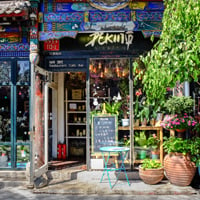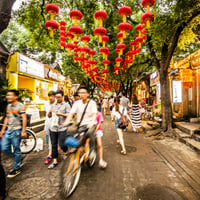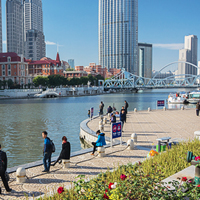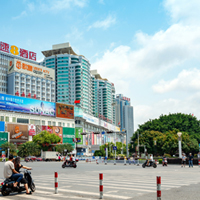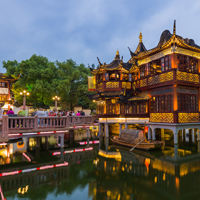China
Coastal BeachesChina, officially known as the People's Republic of China (PRC), is a sovereign state located in East Asia. It is the world's most populous country, with a population exceeding 1.4 billion. China's landscape is vast and diverse, ranging from forest steppes, deserts in places like the Gobi and Taklamakan, to subtropical forests in the south. The Himalayas border China to the southwest, and the world's highest point, Mount Everest, lies on the Sino-Nepalese border. The country's coastline along the Pacific Ocean is 14,500 kilometers long and is bounded by the Bohai, Yellow, East, and South China Seas. The Yangtze and Yellow Rivers, the third and sixth-longest in the world, respectively, run from the Tibetan Plateau to the densely populated eastern seaboard. China's political system is a single-party socialist republic, and its capital is Beijing. China has a rich cultural heritage that dates back thousands of years and is known for its significant contributions to the arts, philosophy, and sciences. The country was one of the earliest centers of human civilization, with one of the world's earliest written language systems. The Chinese economy is the world's second-largest by nominal GDP and the world's largest economy by purchasing power parity. Since the introduction of economic reforms in 1978, China has become one of the world's fastest-growing major economies. As of 2021, it is the world's largest manufacturing economy and exporter of goods. China is also the world's fastest-growing consumer market and second-largest importer of goods. China is a recognized nuclear weapons state and has the world's largest standing army and second-largest defense budget. The PRC is a member of several multilateral and international organizations, including the United Nations, where it has veto power as a permanent member of the Security Council. It is also a member of numerous formal and informal multilateral organizations, including the WTO, APEC, BRICS, the Shanghai Cooperation Organization (SCO), the BCIM, and the G20. China has been characterized as a potential superpower due to its large economy and powerful military. Despite its rapid economic growth and modernization, China faces several major socioeconomic challenges, including demographic issues brought on by its one-child policy, a growing disparity between urban and rural incomes, and environmental issues stemming from rapid industrialization. Additionally, China's human rights record has been criticized by many international organizations. Nevertheless, the country continues to play a crucial role in global affairs and maintains a significant influence on the world stage.
 GeoBlue
GeoBlueGet Quote
GeoBlue is a trusted leader in international health insurance. Wherever your destination, GeoBlue can keep you and your family covered with the right health insurance. Get a GeoBlue Quote Today!
 GeoBlue
GeoBlueGeoBlue is a trusted leader in international health insurance. Wherever your destination, GeoBlue can keep you and your family covered with the right health insurance. Get a GeoBlue Quote Today!
Get Quote
Living in China
Best Places to Live in China
Visa & Residency
Obtaining a residency in China involves several steps and can be a complex process, depending on the type of visa and the applicant's circumstances. The most common residency visas are the Z Visa, which is issued to expatriates who have obtained employment in China, and the Q Visa, for those who are family members of Chinese citizens or permanent residents. To apply for a Z Visa, the applicant must first secure a job with a Chinese employer. The employer will then apply for an employment license and invitation letter from the local authorities. With these documents, the applicant can apply for the Z Visa at a Chinese embassy or consulate in their home country. Upon arrival in China, the holder of a Z Visa must apply for a Temporary Residence Permit within 30 days to legally reside in the country. This permit is usually valid for the duration of the employment contract, up to a maximum of five years. The Q Visa application process requires an invitation from a Chinese family member and proof of the familial relationship. The applicant must submit these, along with other necessary documents, to the Chinese embassy or consulate. Similar to the Z Visa, upon entering China, the Q Visa holder must apply for a Temporary Residence Permit. Digital nomads often use the M Visa, which is intended for business-related activities such as attending trade fairs or conducting short-term business visits. The M Visa does not lead to residency but allows for multiple entries over a period that can extend up to 10 years, with each stay typically ranging from 30 to 60 days. The difficulty of obtaining a residency visa in China can be considered average, but it requires careful attention to detail and adherence to the specific requirements set by Chinese authorities. The process can be time-consuming and may require assistance from legal professionals or visa agents, especially for those unfamiliar with the Chinese language and legal system. It is important to stay updated on the latest regulations, as Chinese immigration laws can change frequently.
Healthcare in China
The healthcare system in China is a hybrid of public and private services. The public healthcare system is predominantly funded by the government and provides basic medical services to the majority of the population, especially in urban areas. It operates under a tiered system, with three levels of hospitals (primary, secondary, and tertiary) that offer varying degrees of care. Tertiary hospitals, usually located in major cities, provide the highest level of care with more specialized services. Private healthcare in China is growing rapidly, offering higher-end services and shorter waiting times, but at a higher cost. Both public and private healthcare facilities vary in quality, with urban centers typically having better-equipped hospitals than rural areas. The cost of healthcare also varies, with public hospitals being more affordable than private ones. Expats and digital nomads can access public healthcare by paying for the public insurance scheme or out-of-pocket for services. However, many expats choose private health insurance to cover private healthcare costs, which provides them with more options and often higher quality care. Access to public healthcare for expats usually requires a work permit or residency status.
Cost of Living
The cost of living in China varies significantly between different regions and cities, with major metropolitan areas like Shanghai and Beijing being more expensive, while smaller cities and rural areas tend to have a lower cost of living.
Weather
China's vast size results in a diverse climate, ranging from tropical in the south to subarctic in the north. The east typically experiences hot, humid summers and cold, dry winters. Western China is home to the Tibetan Plateau with harsher and more varied conditions, while the central region has a more temperate climate with distinct seasons.
Educational System in China
The educational system in China is highly structured and competitive, with a strong emphasis on exams and academic performance. Education is compulsory for nine years, which includes six years of primary education starting at age six, followed by three years of junior secondary education. After completing the compulsory education, students can choose to attend senior secondary school, which lasts for another three years, or they can enter vocational schools. The academic year in China typically starts in September and ends in July, with a summer break in between. The grade levels are generally referred to as "grades" in primary school and "years" in secondary school. Chinese students take the Gaokao, a rigorous college entrance examination, at the end of their senior secondary education. The performance on this exam largely determines their admission to universities. The quality of education in China is considered high, especially in major cities, but there can be significant disparities between urban and rural areas. The focus on rote learning and test preparation has been a point of criticism, but there are ongoing efforts to reform the educational system to encourage more creativity and critical thinking.
Copyright 1997-2025 Burlingame Interactive, Inc.

